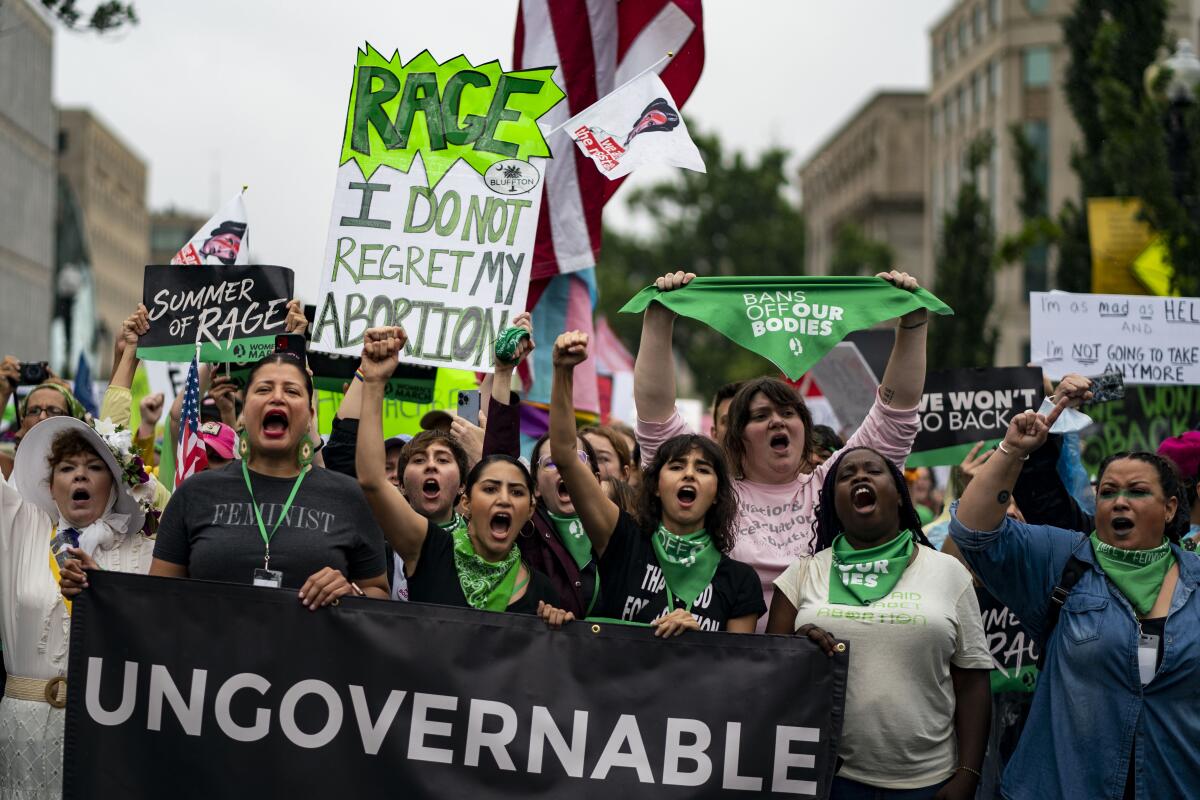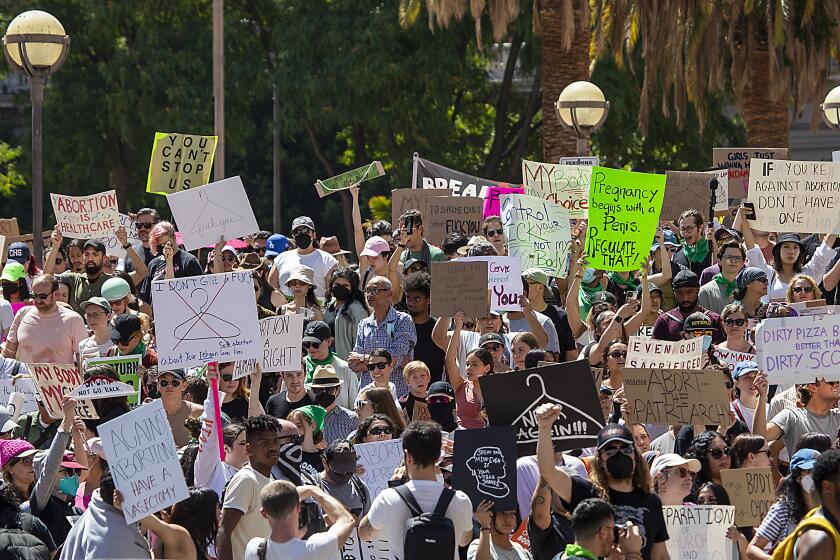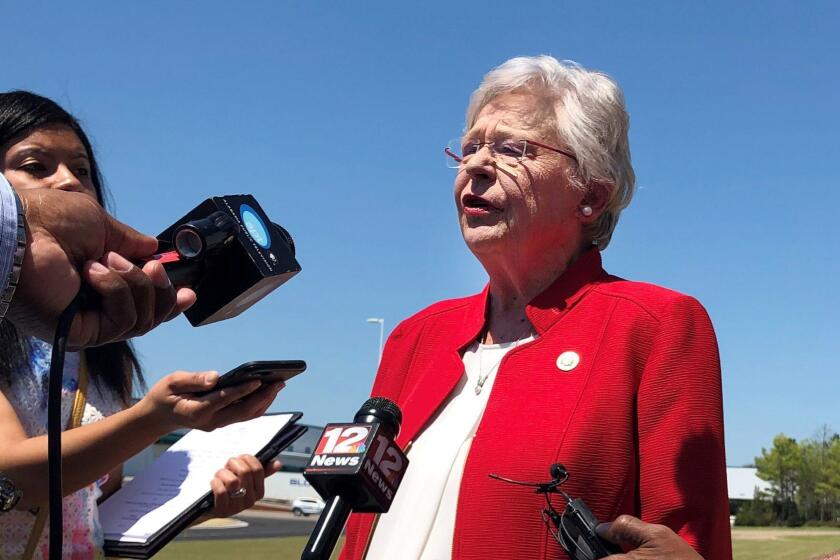Threats to criminalize out-of-state abortions are a scary reminder of 1850s America

- Share via
The Fugitive Slave Act was perhaps the most detested law in all American history.
A product of the Compromise of 1850, which brought California into the union as a non-slave state, the act allowed slaveowners, or even purported slaveowners, to pursue escaped slaves across state lines, made harboring a fugitive a criminal act and required local officials to assist the pursuers.
“It was an act without mercy,” wrote historian Andrew Delbanco in his 2018 book about pre-Civil War America, “The War Before the War.”
May a State bar a resident of that State from traveling to another State to obtain an abortion? In my view, the answer is no based on the constitutional right to interstate travel.
— Supreme Court Justice Brett Kavanaugh
The act had been crafted in the hope of quelling emerging regional conflicts over slavery. But it achieved just the opposite.
Abolitionist Rodney French, a Massachusetts merchant and politician, called it the “most disgraceful, atrocious, unjust, detestable, heathenish, barbarous, diabolical, man-degrading, woman-murdering, demon-pleasing, Heaven-defying act ever perpetrated.”
Get the latest from Michael Hiltzik
Commentary on economics and more from a Pulitzer Prize winner.
You may occasionally receive promotional content from the Los Angeles Times.
The act provoked John Brown to attack the federal garrison at Harper’s Ferry, Va. It led to the Dred Scott decision of 1857, widely regarded as the worst Supreme Court decision ever, in which Chief Justice Roger B. Taney wrote for a 7-2 majority that slaves and their descendants could not claim U.S. citizenship, nor did they have any “rights which the white man was bound to respect.”
The Fugitive Slave Act was a federal law. Yet several red states are prepared to replicate it on their own books. The quarries this time aren’t Black slaves, but those who assist pregnant women to seek abortions out of state, including employers who pay for the travel and others who help them.
The trigger for the new laws is the Supreme Court’s decision in Dobbs vs. Jackson Women’s Health Organization, which overturned the constitutional guarantee of abortion rights established by its decision in Roe vs. Wade in 1973.
Anti-abortion states have passed or are considering laws that would expose out-of-state medical providers to civil or criminal liability for assisting in abortions, while some pro-choice states have taken steps to shield their providers or residents from such actions.
In Texas, those who assist women to get abortions would be vulnerable to civil lawsuits from even out-of-state plaintiffs, who could sue for $10,000 or more in penalties. Oklahoma and Idaho have passed similar laws. Missouri lawmakers are considering a statute that would allow lawsuits against anyone helping a Missouri resident to get an abortion, including an out-of-state doctor who performed the procedure or those who helped the patient cross the state line. The law’s sponsor has said it’s targeted at a Planned Parenthood clinic in Illinois opened to serve patients from the St. Louis area.
Sen. Marco Rubio (R-Fla.) is back with the worst proposal for family leave yet.
Pro-choice states with shield laws or policies include California, where Gov. Gavin Newsom signed a law on June 24 — the very day that the Supreme Court handed down the Dobbs decision — immunizing Californians from civil liability imposed by other states for abortions.
Atty. Gen. Merrick Garland said the day of the decision that the Department of Justice will protect “healthcare providers and individuals seeking reproductive health services in states where those services remain legal.”
Garland noted: “Under bedrock constitutional principles, women who reside in states that have banned access to comprehensive reproductive care must remain free to seek that care in states where it is legal.”
Still, the post-Roe landscape has thrown law and medical practice into confusion nationwide, especially in anti-abortion states. Pharmacists and medical providers already have limited patient access to drugs that can be used to induce abortions, even when they’re prescribed for other purposes.
According to Alexandra Band, a New Orleans OB-GYN, Walgreen’s refused to fill a prescription for a patient for misoprostol, a gastrointestinal drug that can also be used for abortions, “because they could not be sure we weren’t prescribing this for an abortion.” Band said in an affidavit that she had prescribed the drug to facilitate the insertion of IUD.
The prospect that doctors in antiabortion states have been prevented or discouraged from terminating pregnancies to protect the health of the mother, including in cases of ectopic pregnancies or miscarriages, prompted the Biden administration to issue a stern warning Monday that any interference with a doctor’s judgment in emergency cases, including whether an emergency abortion is indicated, would violate federal law, which preempts state laws.
Violation could subject doctors, hospitals or clinics to the loss of the Medicare privileges or to civil penalties, Health and Human Services Secretary Xavier Becerra said.
A key issue in the abortion fight is whether anti-abortion states can regulate the travels of their citizens or reach beyond their state lines to regulate activities elsewhere. With Roe vs. Wade overturned, law professors from three Pennsylvania universities observe in a draft paper, “we have already seen the beginnings of these battles.”
A judge’s ruling blocking the new Texas abortion law lays out how malevolent it is.
Among the signposts is Texas’ infamous SB 8, an anti-abortion law that allows anyone, even outside Texas, to bring civil suit against anyone in Texas who “knowingly” aids or abets the performance of an abortion the state deems illegal, including by paying for or reimbursing the costs of an abortion.
A model law promoted by the National Right to Life Committee would criminalize transporting a minor across state lines to obtain an abortion or abortion drugs without her parents’ consent, “regardless of where an illegal abortion occurs.” Missouri legislators are considering a law that would impose civil liability on anyone helping a Missouri citizen travel out of state for an abortion.
In Texas (again), a group of state legislators styling themselves the Texas Freedom Caucus engaged in a remarkable bout of saber-rattling with a July 7 letter to Sidley Austin, a major Dallas-based law firm, threatening the firm with civil or criminal action because it has “decided to reimburse the travel costs of employees who leave Texas to murder their unborn children.”
The letter said that by “facilitating” illegal abortions, it is “exposing itself and each of its partners to felony criminal prosecution and disbarment.”
The legislators said they would be introducing a bill to “prohibit any employer in Texas from paying for elective abortions or reimbursing abortion-related expenses — regardless of where the abortion occurs, and regardless of the law in the jurisdiction where the abortion occurs,” classifying those actions as criminal offenses. Sidley Austin hasn’t responded publicly to the letter.
Although freedom to travel around the country would seem to laypersons to be an unimpeachable constitutional right, legal experts are divided on whether the Constitution actually forbids states to enforce laws “targeting out-of-state abortions or abortion travel,” wrote Pennsylvania law professors David S. Cohen of Drexel University, Greer Donley of the University of Pittsburgh and Rachel Rebouché of Temple University.
Supreme Court Justice Brett Kavanaugh, in his concurring opinion in Dobbs, implied that the right to travel is sacrosanct, regardless of its purpose: “May a State bar a resident of that State from traveling to another State to obtain an abortion? In my view, the answer is no based on the constitutional right to interstate travel.”
States with only 11% of the U.S. population got their way in the abortion ruling. This isn’t democracy.
Kavanaugh cited the due process clause of the 14th Amendment to support his view. Justice Clarence Thomas, however, in his own concurring opinion, threw cold water on Kavanaugh’s. “The purported right to abortion,” he wrote, “is not a form of ‘liberty’ protected by the Due Process Clause.” He called the very idea “farcical.”
Only one Supreme Court ruling handed down after Roe vs. Wade touched on the issue of regulation of out-of-state abortion rules. This was a 1975 case involving a weekly distributed at the University of Virginia with an advertisement for abortion services in New York, where they were legal.
Virginia courts found that the newspaper violated a state law prohibiting publications from encouraging abortions. The Supreme Court found not only that the Virginia law infringed on the right of free speech, but that “Virginia possessed no authority to regulate the services provided in New York” or to “prevent its residents from traveling to New York to obtain those services.”
Nothing would prevent the current Supreme Court from revisiting the 1975 case, just as it reconsidered Roe vs. Wade. The ruling, according to the Pennsylvania professors, “is dated, relies in part on the now-overturned Roe, and concentrated on the First Amendment.”
Therefore, they wrote, “this area of law is ripe for reassessment once interjurisdictional abortion prosecutions occur.” Nor will anti-abortion states or prosecutors wait for a green light from the Supreme Court before testing the law’s limits; “they will just do it. ... States will proceed as if they have the power, waiting for courts to call their bluff.”
This shouldn’t come as a surprise, since it’s a relationship that’s been known for years, but the states with the harshest restrictions on abortions also have the worst infant mortality rates.
It will remain up to the federal government to monitor those limits and impose federal guidelines where necessary. Garland’s promise is an important first step and the guidance issued Monday by the Department of Health and Human Services an encouraging follow-up.
HHS Secretary Becerra cited the federal Emergency Medical Treatment and Active Labor Act as the governing regulation in all cases in which emergency care is needed.
The law mandates that all patients “receive an appropriate medical screening examination, stabilizing treatment, and transfer, if necessary, irrespective of any state laws or mandates that apply to specific procedures,” he stated.
The federal statute preempts any state law that would be more restrictive. Its definition of stabilizing treatment “could include medical and/or surgical interventions (e.g., abortion, removal of one or both fallopian tubes, anti-hypertensive therapy, methotrexate therapy etc.), irrespective of any state laws or mandates.”
If a physician decides that abortion is the proper stabilizing treatment, Becerra’s letter states, “the physician must provide that treatment.”
So much for state efforts to turn women, pregnant or otherwise, into property whose behavior can be criminalized or subjected to civil liability. The federal government has begun to draw the line. State legislators and prosecutors who try to cross it are trying to provoke a new Civil War, even though the first one didn’t turn out well for the provocateurs, or for the whole country.
More to Read
Get the latest from Michael Hiltzik
Commentary on economics and more from a Pulitzer Prize winner.
You may occasionally receive promotional content from the Los Angeles Times.














